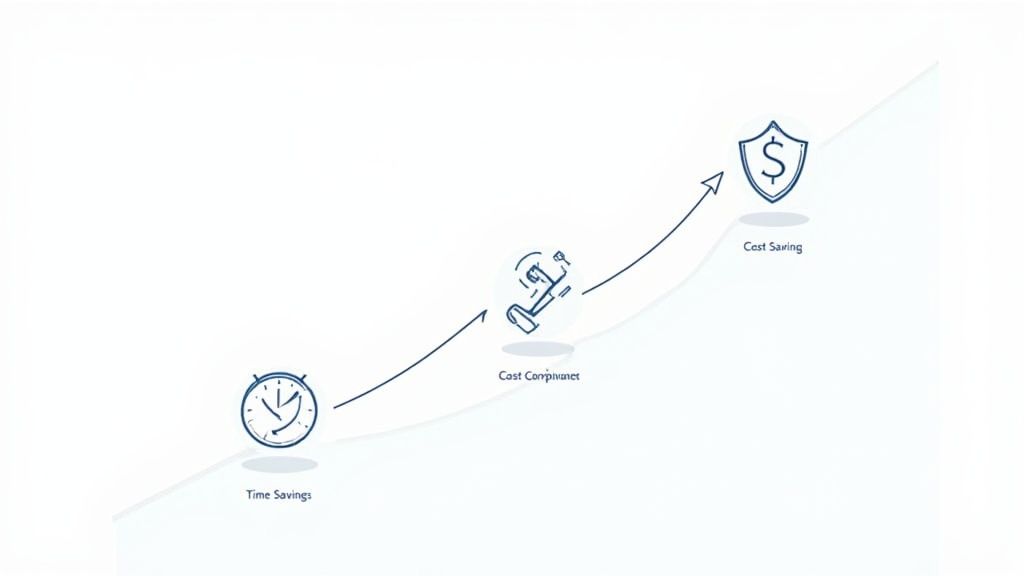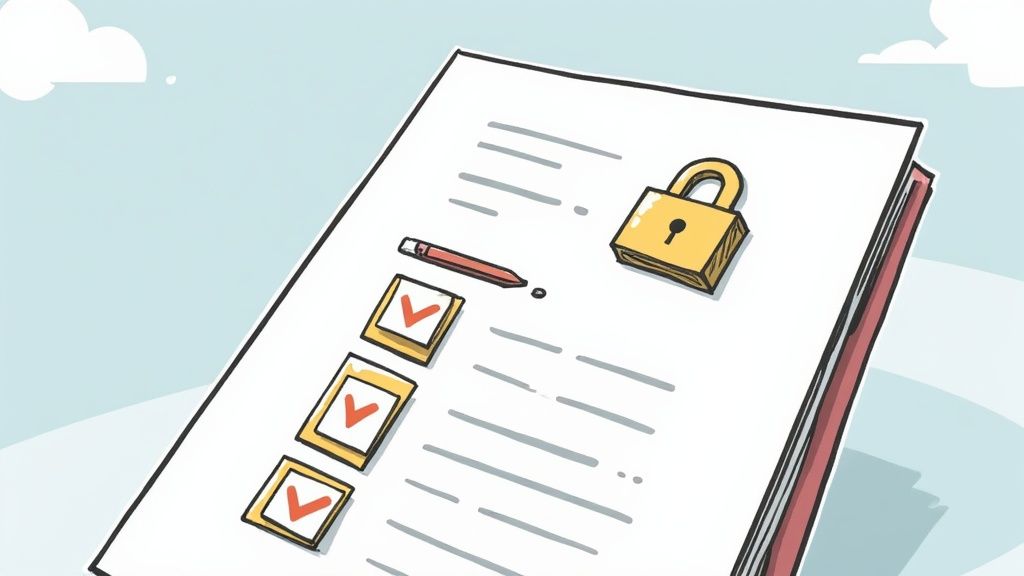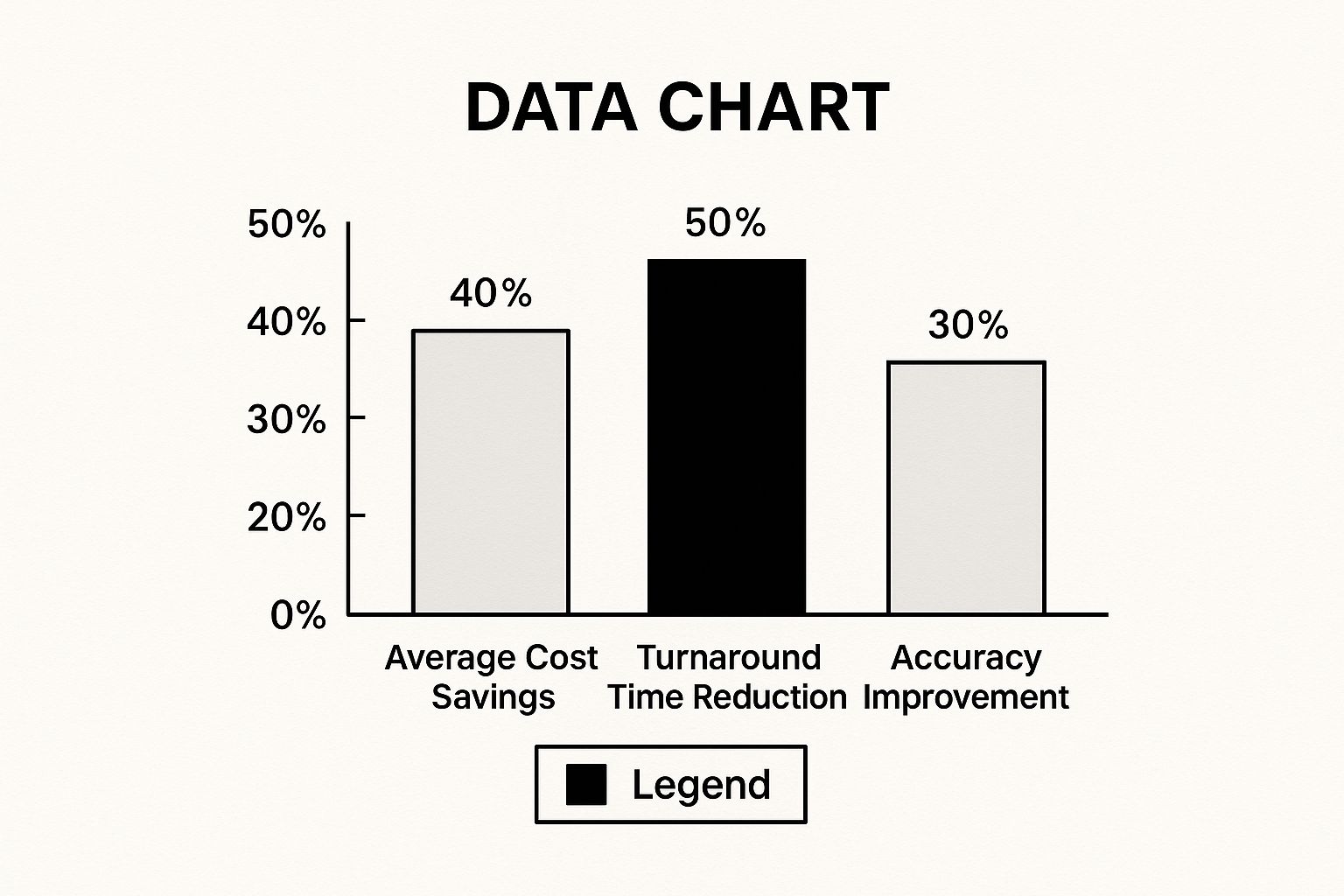
 16 minutes read
16 minutes read
Let's get one thing straight. Legal process outsourcing isn't about farming out your core business. It’s about being smart enough to stop wasting your best legal minds on work that doesn’t require a legal mind.
Think of it this way: a world-class chef doesn't chop her own onions. She hires a kitchen staff so she can focus on creating an incredible menu. LPO is that same logic, applied to the legal world. It's about letting your top talent do what they do best, instead of getting buried in the grunt work.

Nobody survives law school dreaming of a glorious career spent chasing down signatures or proofreading a 500-page contract for the third time. Yet, for too many brilliant attorneys, that’s where the billable hours go to die.
Legal process outsourcing (LPO) is the brutally simple answer. It’s the deliberate choice to hand over routine, soul-crushing legal tasks to a specialized outside provider. This isn't about offshoring your firm's strategy. It's about being honest with yourself: a senior partner's time is better spent winning a case than playing "spot the typo."
Forget the corporate jargon. In the real world, LPO means getting actual, tangible help.
And this isn't just for the big guys anymore. The LPO market was valued at USD 21.6 billion in 2025 and is projected to hit a wild USD 157.9 billion by 2035. That's not a trend; it's a seismic shift in how legal work gets done.

It's a classic founder's lesson: stop wasting your most expensive assets on your least valuable tasks. LPO lets you aim your legal firepower at the challenges that actually make you money.
The goal isn't to replace your team. It's to make them better. When you offload the drudgery, your paralegals and junior associates can finally tackle the meaningful work that builds their careers. This is the whole point of effective legal service outsourcing—building a leaner, meaner, and way more profitable practice.

Feeling that squeeze? That nagging sense you’re running on a hamster wheel—working harder but getting nowhere? That’s the slow, creeping burnout that comes from being too busy chopping wood to stop and sharpen the axe.
Most firms think they're saving money by keeping every task in-house. It’s a common mistake, and it’s costing you a fortune. The real price you’re paying doesn't show up on a balance sheet. It’s the silent killer of profitability, draining your resources right under your nose.
Let's talk about your best people. You hired sharp, ambitious lawyers to win cases, not to spend 60% of their day in a mind-numbing document review vortex. Every hour they waste on low-value work is a lost hour they could have spent on the client-facing strategy that actually grows your firm.
This is what I call the billable hour black hole. It’s where your highest-paid talent gets sucked into tasks a specialized team could handle faster, cheaper, and probably with fewer errors.
Just look at the time sinks:
This work doesn't just eat time; it crushes morale. Nobody gets pumped to proofread boilerplate for the tenth time. Burnout isn't just a "people problem"—it's a direct threat to your bottom line and your ability to keep the talent you fought so hard to hire.

Resisting LPO isn't saving you money. It's an unintentional investment in inefficiency, guaranteeing your most expensive people are consistently doing your cheapest work.
Beyond burnout, there’s an even bigger, more insidious cost: all the opportunities you're missing. While your team is stuck in administrative quicksand, your competitors are outmaneuvering you. They're focused on strategy, landing new clients, and building their brand—all because they were smart enough to offload the grunt work.
This isn't just about shaving a few bucks off payroll. Exploring options like competitive virtual paralegal rates isn't about finding cheap labor. It's about seeing just how much you’re overpaying for inefficiency. It's about reclaiming your firm's focus.
So, do you want to compete on who can review the most documents, or on who delivers the most brilliant legal strategy? Choose wisely.

Look, everyone leads with cost savings. Yawn. That’s the bare minimum. If your LPO partner isn't saving you money, you’ve picked the wrong partner. But if that's all you're focused on, you're missing the entire point.
The real magic of LPO is the strategic power it unlocks. It’s what transforms your firm from a clunky, overhead-heavy machine into a lean, agile force that can punch way above its weight class. It’s about rewriting the rules of what a firm your size can actually pull off.
Ever wish you could clone your best paralegal? LPO is the next best thing. Partner with a team in a different time zone, and your workday no longer ends at 5 PM. Critical document tagging, legal research, and discovery work happen while your local team sleeps.
This isn't about burning people out; it’s about a continuous, 24/7 workflow. Your US-based team leaves for the day, and when they come back, a mountain of completed work is waiting for them. That’s how you crush deadlines without crushing your people.
Let’s be honest. You can’t afford to hire a full-time expert for every possible legal niche. Need a patent law guru for a single, complex case? Or an e-discovery wizard who lives and breathes metadata? Good luck finding them, and even better luck paying them.
LPO gives you an on-demand roster of specialists without the W-2 commitment. You tap their brain when you need it, and they’re gone when you don’t.

This is scalability on your terms. It's the power to staff up for a massive case without having to mortgage the office ping-pong table for temporary hires.
This model is exploding for a reason. The LPO market, valued at USD 22.14 billion in 2025, is projected to hit USD 58.73 billion by 2029. That insane 27.6% growth isn’t just about saving a few bucks; it’s driven by firms demanding more flexibility and deeper expertise. You can check out the LPO market's rapid expansion here.
Ultimately, the smartest firms get it. Legal process outsourcing isn't just an expense line. It's a strategic weapon. It frees your best people to focus on the high-value work that builds reputations and wins cases. And you can't put a price on that.
Alright, you're sold on the idea. Now for the big question: where do you hire these people? This decision isn't just about maps; it's about what your firm values most. It’s a classic tug-of-war between cost, control, and communication.
Let's break down the three main models—onshore, offshore, and hybrid—so you can figure out which one actually works for you.
This is the vanilla option. Your LPO provider is located right here in the U.S. The big win here is simplicity. Same time zone, same culture, same laws.
Communication is a breeze, which is perfect for complex projects that need a lot of back-and-forth. The catch? The cost. You're still paying U.S. wages, so the savings won't be jaw-dropping. It’s the premium choice for firms that value control over deep cost-cutting.
This is where the game-changing numbers are. By partnering with providers in countries like India or the Philippines, firms can slash operational costs by as much as 70%. That’s a figure that’s hard to ignore.
Beyond the money, you unlock that 24/7 work cycle we talked about. Your offshore team grinds away while you sleep, effectively doubling your firm's daily output. The trade-off is that you need airtight project management. You have to be deliberate about bridging time zones and cultural gaps. It takes more work upfront, but the payoff is massive.
This is the kind of impact we're talking about when you get it right.

As you can see, the hit to turnaround times and costs is real, making a damn good case for looking beyond your own zip code.
The hybrid model tries to have its cake and eat it too. You keep the high-value, client-facing work with a small onshore team, while offloading the high-volume grunt work to an offshore partner. A U.S.-based project manager acts as the quarterback, ensuring nothing gets lost in translation.
When it works, it's brilliant. You get the huge cost savings of an offshore team with the accountability of a local partner. This model is fueling explosive growth in the Asia-Pacific LPO market, which is projected to expand at 30.20% through 2030. You can discover more insights about this global LPO shift if you're curious.
The trick is finding a provider who has actually mastered this dance. Otherwise, you’re just adding another layer of complexity.
Let’s cut the crap. Here’s a no-nonsense comparison focusing on what actually matters to your firm's sanity and bottom line.
| Factor | Onshore (e.g., USA) | Offshore (e.g., India, Philippines) | Hybrid Model |
|---|---|---|---|
| Cost Savings | Modest (10-25%) | Significant (40-70%) | High (30-60%) |
| Communication | Seamless, real-time | Needs planning, works while you sleep | Blended; local contact wrangles offshore comms |
| Turnaround Time | Standard business hours | Potential for 24/7 work cycles | Can hit 24/7 cycles with local oversight |
| Cultural/Legal Alignment | High; same jurisdiction | Needs careful vetting and training | Moderate; U.S. lead bridges the gaps |
| Ideal For | Super sensitive projects needing constant hand-holding | High-volume, repeatable tasks like doc review, research | A smart mix of strategy and back-office execution |
There's no single "best" model. The right choice is a strategic one that lines up with your firm’s goals and risk tolerance. Don't fall for a sales pitch; be honest about what you need.
Here’s where most firms screw up. They think signing the contract is the finish line. Nope. It’s the starting gun. Mess this part up, and you’re headed for a world of missed deadlines and awkward client apologies.
Forget the generic checklists. This is a battle-tested roadmap for a smooth rollout—one that stops tiny problems from becoming catastrophic failures.
First, your Scope of Work (SOW) needs to be painfully specific. "Handle document review" is a useless instruction. That’s like telling a builder to "build a house." You're just begging for trouble.
You need to get granular. Ridiculously granular.
A vague SOW is an invitation for scope creep, budget overruns, and a whole lot of finger-pointing. Don't be that firm.
Next up: the two things that keep managing partners awake at night. Data security and communication breakdowns. When you hand over client data, you are 100% on the hook for protecting it.
Your LPO partner’s security shouldn't just be "good"; it needs to be bulletproof. Demand to see their ISO 27001 or SOC 2 compliance reports. If they can’t produce them, walk away. It’s that simple.
Communication is the other side of the coin. Time zones are a fact, not an excuse. You need a communication rhythm that works.

The goal isn't to delegate tasks; it's to integrate a team. True integration requires trust, and trust is built on clear, consistent, and brutally honest communication.
This is where you find out if you chose the right partner. Investing the time upfront to outsource legal services with a clear plan will save you from a world of hurt. It’s the unglamorous work that makes LPO a brilliant success instead of a cautionary tale.
Alright, let's get real. Outsourcing isn't a magic wand. If you're not careful, it can blow up in your face. Anyone who tells you legal process outsourcing is risk-free is either naive or selling something.
The good news? The biggest risks are also the most predictable. Knowing where the landmines are is half the battle. This isn't about fear-mongering; it's about being smart.
What happens when your client's most sensitive files are sitting on a server halfway around the world? This is the question that should keep you up at night. Your ethical obligations don't take a vacation just because the work is done offshore; they get magnified.
The answer isn't to run scared. It's to be ridiculously demanding when you vet your partners.
Your reputation is on the line. Treat your LPO provider’s security as an extension of your own.
The second way this goes wrong is when you lose control over the quality of the work. How do you ensure excellence without micromanaging your provider to death? It’s a tightrope walk. You hired them to save you time, not to become a full-time quality inspector.

The classic mistake is assuming a signed contract means you both agree on what "quality" means. You don't. Quality must be explicitly defined, measured, and enforced.
Start small. Never, ever hand over your biggest case on day one. Kick things off with a low-stakes pilot project. This is your test flight. It lets you see how they communicate and perform without betting the farm.
Use that trial to build a feedback loop. Be brutally honest. A good partner will thank you for the feedback. A bad one will get defensive. And that tells you everything you need to know.
You've heard the sales pitch. The numbers look good. But now the practical, "how does this actually work" questions are bubbling up. Let's tackle the stuff people ask when they're seriously considering this.
Here's the simplest way to think about it: separate the practice of law from the business of law. LPO is for the business side. Focus on tasks that are high-volume, repeatable, and follow a predictable process.
The rule of thumb: If the work doesn't require giving direct strategic advice to a client, it's fair game. You're offloading the engine room tasks so you can stay on the bridge, steering the ship.
Prime candidates:
What should you never outsource? Core legal strategy, client advisory, and court appearances. That’s your secret sauce. Don't give it away.
You can't just cross your fingers and hope. Ensuring quality is an active job, not a passive wish. It starts with vetting. Ask for case studies, talk to their current clients, and review anonymized work samples.
Once you pick a provider, your Service Level Agreement (SLA) is your bible. Be painfully specific. Define success with clear, measurable metrics. What’s the acceptable error rate? What are the turnaround times? Put it in writing.
Even better? Start with a pilot project. Give them a simple, non-critical task and see how they do. Their performance on that small test will tell you everything you need to know before you hand over the keys to the kingdom.
Yes, but with a giant asterisk. The American Bar Association (ABA) has given its conditional blessing to outsourcing legal support, but with one critical rule you can't ignore.

The supervising law firm always retains ultimate responsibility for the work product.
The buck stops with you. Period. This means you must partner with a provider that understands U.S. ethical standards and has ironclad data security (look for that ISO 27001 certification). You are always the lawyer of record. LPO is a powerful tool, but it never, ever replaces your professional judgment or ethical duties.
Ready to stop drowning in administrative quicksand and reclaim your firm's focus? HireParalegals gives you on-demand access to a network of over 10,000 pre-vetted legal professionals, so you can scale smarter and faster. Find your perfect remote paralegal today.